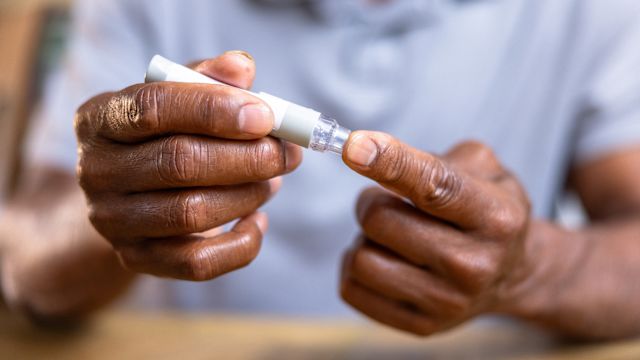Updated on December 14, 2023
The macula is a cluster of light-sensitive cells that enables central vision. When you read a word, look at a detail, recognize a face, or focus your vision on what is in front of you, that is the macula at work.
Diabetic macular edema (DME) is a complication of diabetes that causes the macula to swell and fill with fluid. It occurs when blood vessels inside the eye become damaged and leak (which itself is another complication of diabetes, called diabetic retinopathy).
Blurred vision, wavy vision, floaters, and washed-out colors can all be symptoms of DME. Symptoms and severity of symptoms will vary from person to person, but typically get worse over time—especially when DME is left untreated.
Without treatment, the vision loss caused by DME can become progressively more severe. DME is one of the leading causes of vision loss throughout the world.
Here, we look at five key strategies for treating and managing DME.
Diabetes control
Diabetes control is an essential part of treatment. This includes control over A1C, blood pressure, and cholesterol (called the diabetes ABCs), which contribute to DME, diabetic retinopathy, and other diabetes complications.
This may involve making changes to the therapies being used to manage diabetes. It also typically involves lifestyle changes, such as changes to diet, being more physically active, losing weight, and quitting smoking (for anyone who smokes).
Coordinated care
The need for diabetes control highlights another important aspect of treating DME—communication and coordination between healthcare providers. Treatment for DME needs to fit into a larger treatment plan for diabetes, and this is usually overseen by a primary care provider. A primary care provider can help coordinate care with eye specialists and other members of a healthcare team, such as an endocrinologist, a diabetes care and education specialist, and a cardiologist.
Anti-VEGF injections (and other treatment options)
The main treatment for DME is anti-VEGF therapy. Anti-VEGF medications block a protein called VEGF (vascular endothelial growth factor). Excess amounts of this protein occur as a result of elevated blood glucose levels and are one of the major contributing factors to damaged blood vessels in the eyes.
- Ask about the procedure. Anti-VEGF therapy involves receiving injections into the eye. This can be intimidating, but a numbing agent is used and the injections are not typically painful. Ask your provider to go over the process so you know what to expect, and bring up any concerns you have.
- Ask about the dosing schedule. The number of injections and the frequency of injections can vary from person to person. It can also vary depending on the medication and dose being used.
- Ask about the other treatments for DME. Corticosteroid injections and laser treatments are also used to treat DME, though these are less commonly used than anti-VEGF therapy.
- Ask how progress will be monitored. Treatment goals and the response to a particular treatment can vary from person to person. Ask your healthcare provider what kind of result your treatment can achieve, and how you will know if a treatment is working.
Vision rehabilitation
Many people with DME experience a degree of vision loss. Vision loss is a change to vision that cannot be fully corrected. Vision rehabilitation is a program that helps a person adjust to vision loss and make the best use of the vision they have, and it can be a valuable part of a treatment plan for DME. Vision rehabilitation can include the use of assistive devices and technologies, making adaptations at home or work, and learning about community resources.
Mental health
Mental health should be something that you discuss with a healthcare provider. Vision impairments can place a significant burden on mental and emotional wellbeing. Many people experience feelings of depression, anxiety, frustration, guilt, loss of independence, and isolation. Mental health can be difficult to talk about, and it should not be managed on your own. Working with a counselor or therapist can help a person recognize and address this aspect of living with vision loss.






